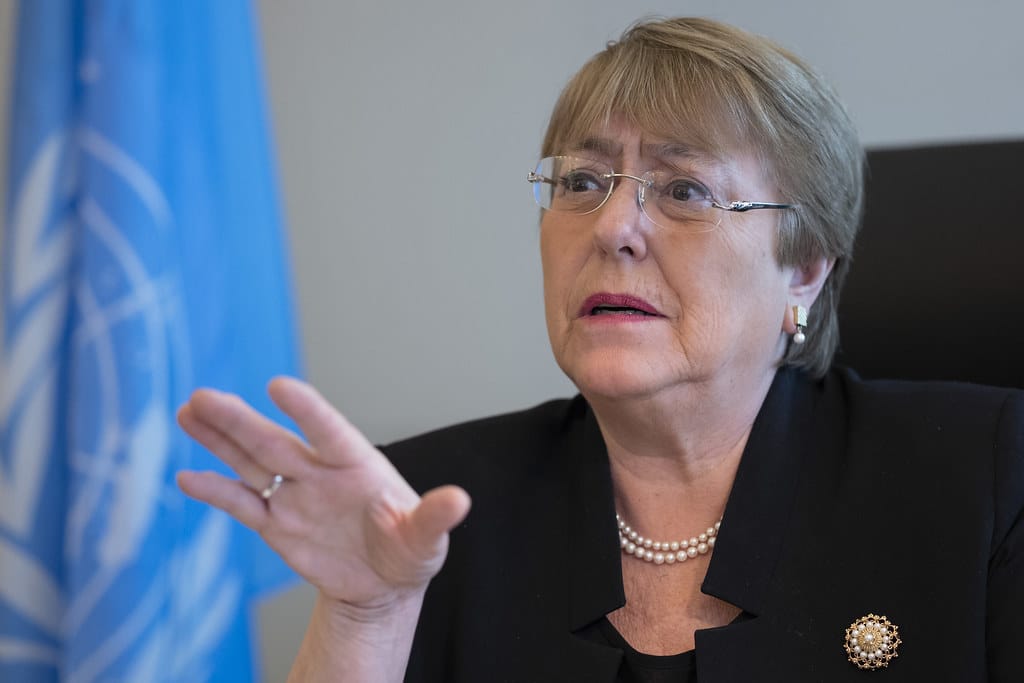Victims of Communism Memorial Foundation Urges UN High Commissioner to Insist on More Transparency and Cooperation Ahead of China Trip

WASHINGTON, D.C. — Today the Victims of Communism Memorial Foundation (VOC) added its name to the signatory list of organizations that recommend that the UN High Commissioner for Human Rights adopts nearly a dozen key conditions ahead of a scheduled visit to China in May. The conditions are intended to accurately and comprehensively ascertain the full nature and scope of alleged human rights violations in a country that has routinely worked against such visits in the past. Full and open access is a prerequisite to ensuring that human rights can be secured in China.
Michelle Bachelet, the UN High Commissioner for Human Rights, announced a visit to China in May of 2022 to investigate charges of grave human rights violations at a level amounting to crimes against humanity. The visit will occur three and half years after her initial request for unrestricted access. It has since been determined that the High Commissioner did not take adequate public diplomacy steps to respond to allegations of serious rights violations in the country in a timely manner, despite overwhelming evidence. China has been accused of using forced labor, population repression techniques, detention of lawyers, and prosecuting human rights defenders throughout the country, including Tibet and Hong Kong.
To protect fundamental freedoms in China, the need for a fully independent human rights assessment with respect to violations of international law is critical. An area of particular concern involves Xinjiang, the Uyghur region. However, the Commissioner’s visit announcement made no mention of the human rights violations in the region.
Signatories have expressed concern over the perceived lack of coherence and capability in the High Commissioners’ approach to addressing serious allegations against a major power. The office’s silence on the violations occurring in Tibet compared to her predecessors has only added to the perception of indifference and inability to steer change.
“A visit of this importance is no small undertaking, and it requires cooperation from China to ensure that OHCHR can make a credible visit.” said VOC President and CEO Ambassador Andrew Bremberg. “It is vital that the High Commissioner be transparent prior to a visit, and release the terms of reference for the trip and disclose any requests that were not agreed to.”
To secure the best outcomes for oppressed peoples in China and the region, the civil society organizations have outlined a number of core minimum conditions that must be met for the High Commissioner’s May visit to be credible:
- Release the OHCHR report on serious human rights violations in Xinjiang, the Uyghur region, promptly and ahead of the visit;
- Meet safely with independent civil society organizations, human rights defenders, and victims from, or working in relation, to China, including groups in the diaspora, in advance of the visit;
- Make inquiries about, and secure confidential and unsupervised meetings with, human rights defenders and others who have been forcibly disappeared, or are arbitrarily detained, including serving sentences or in pre-trial detention, in order to assess their well-being and the compliance of their deprivation of liberty and conditions of detention with international standards;
- Ensure transparency with respect to measures taken to date to ensure access to China is effectively unfettered, including but not limited to diplomatic reassurances, and steps to mitigate and respond to any breach of agreement by the Chinese authorities;
- Include among the visit team relevant Special Procedures mandate-holders, including the Special Rapporteur on human rights and counter-terrorism;
- Ensure respect for a set of minimum standards for independent, unfettered access; publicly report on, and interrupt the visit in case of a breach of agreement by the Chinese authorities. These standards should include:
- Fully unhindered access to all areas including Uyghur and Tibetan regions and Hong Kong, which entails:
- Freedom of movement in the whole country, including the Xinjiang Uyghur Autonomous Region (XUAR), the Tibet Autonomous Region (TAR), and other restricted areas
- Freedom of inquiry
- Guarantees that any official security protection, including on grounds of ‘counter terrorism’, and other forms of accompaniment, including in the name of ‘Covid-19 prevention’, are provided in ways that do not prejudice the security, privacy, confidentiality, or freedom of movement and inquiry;
- Robust risk assessment and mitigation measures to minimize the possibility that any individual, group, or organization suffers threats, harassment, punishment, or any other form of intimidation or reprisal, as a result of cooperation and communication with the visit team in any way;
- No information on any parts of the visit program involving meetings with civil society is shared with state authorities, including guarantees that no state officials, including law enforcement officials, are present during interviews with victims or other actors. Interviews should be exclusively conducted on UN or diplomatic premises, with interpretation if needed, provided solely through UN-recruited or -selected independent interpreters, to ensure the protection of victims or witnesses. For individuals held in detention facilities, interviews should be confidential with UN-recruited or -selected interpreters, and without state officials’ presence;
- Ensure meaningful and safe participation by a diverse pool of independent civil society organizations, human rights defenders, individuals, and victims, during the preparatory phase of any visit through separate, dedicated meetings for different regions and communities, and undertake broad consultations during and after the visit in a safe and confidential manner;
- Ensure that field investigations use existing UN information, such as Special Procedures communications and Treaty Body reviews, as a foundation for inquiry.
For further information, please contact: voc@pinkston.co
Victims of Communism Memorial Foundation is an educational, research, and human rights nonprofit devoted to commemorating the more than 100 million victims of communism around the world and to pursuing the freedom of those still living under totalitarian regimes.
###

